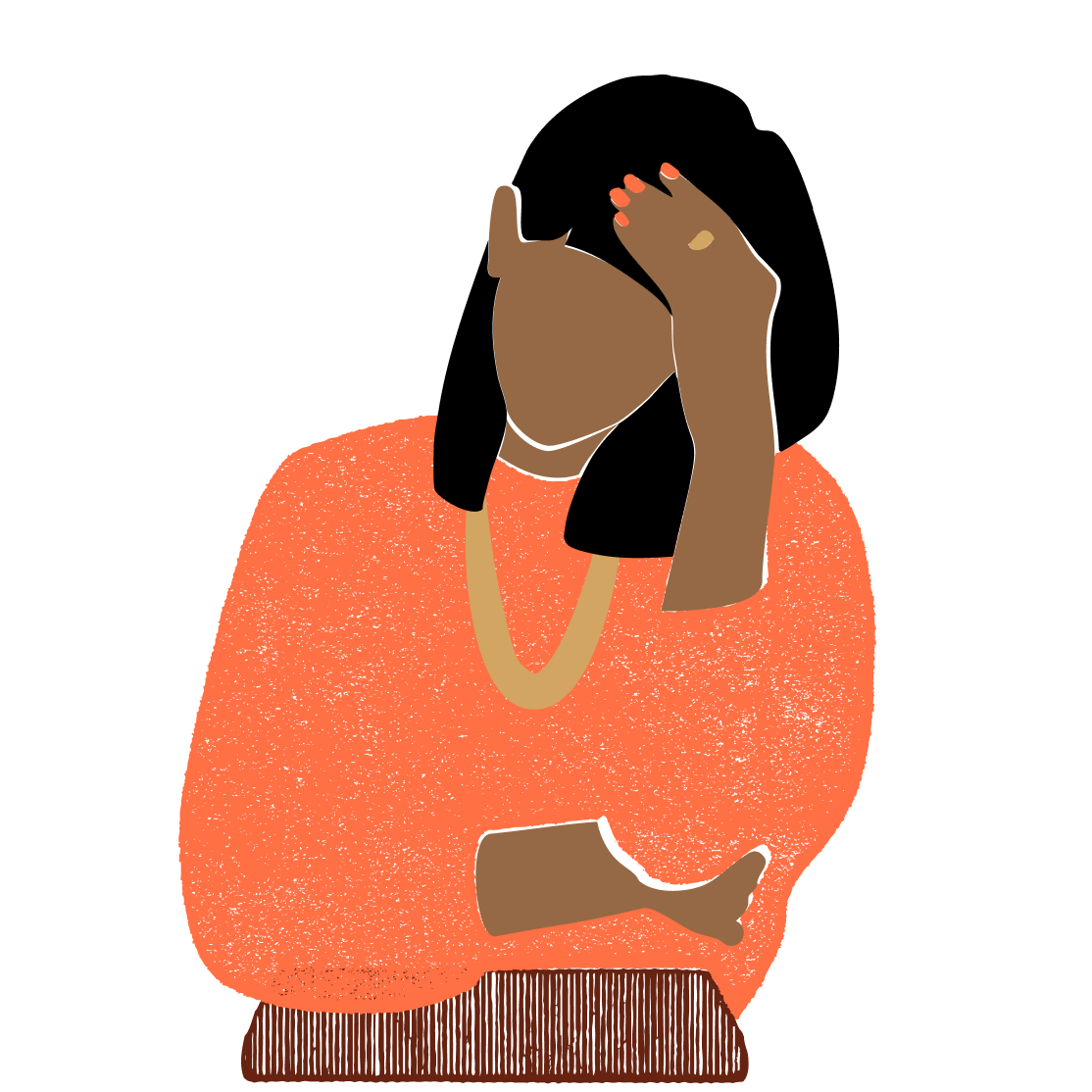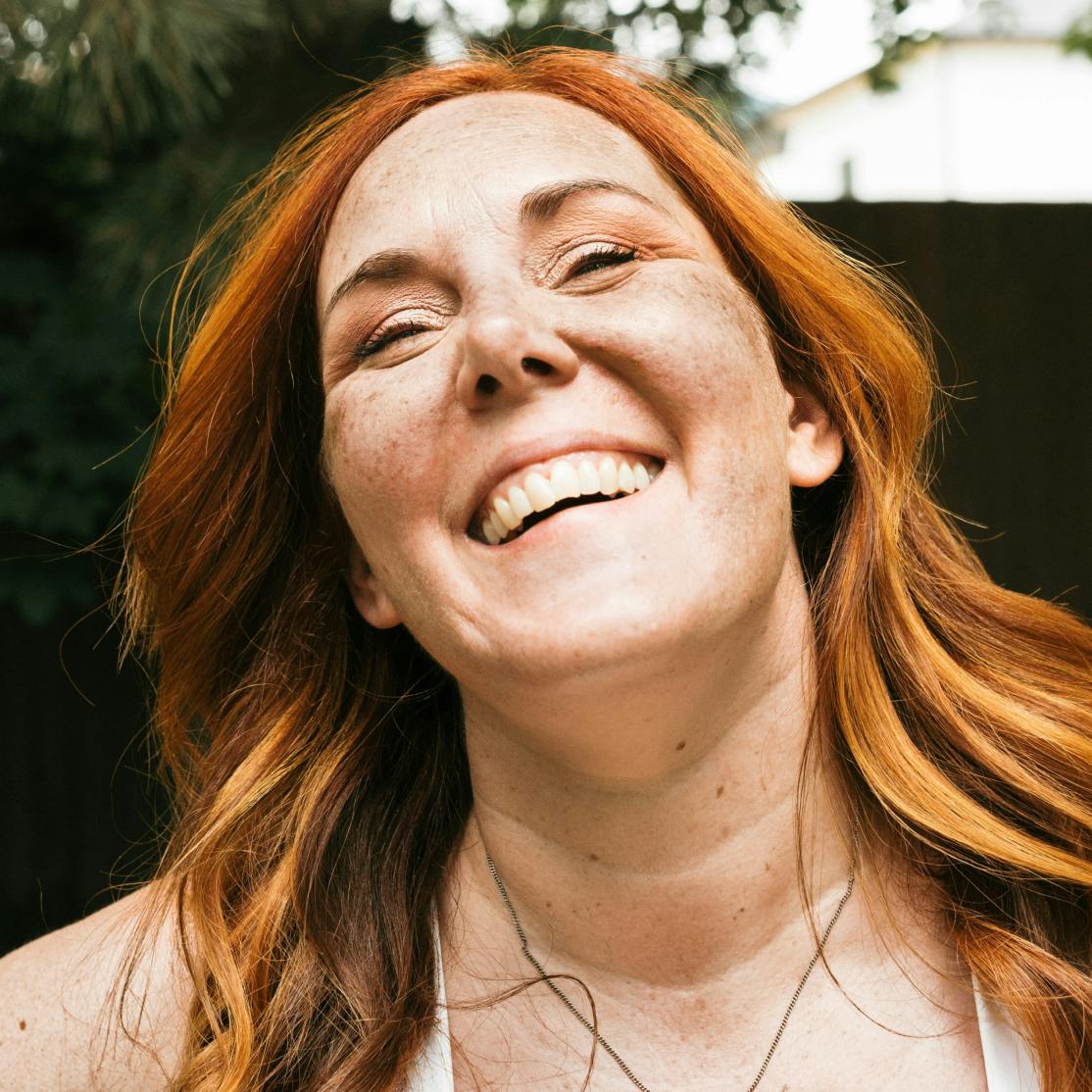Feeling perpetually on edge, overwhelmed, or worried? Getting hit with a racing heartbeat out of nowhere or jolting awake at 2 a.m. with a sense of impending doom? Welcome to the intersection of perimenopause and anxiety—a busy, disorienting, yet often-ignored crossroads traveled by more than half of all women in midlife. Perimenopausal anxiety is one of the most commonly reported but least discussed symptoms of midlife. That ends now. At Midi Health, we want you to feel seen and validated; to understand the hormonal changes that can fuel anxiety in perimenopause; and to feel confident reaching out for care, which may include hormonal support, lifestyle tweaks, and behavioral health tools to help you better manage your anxiety.
In the viral “Anxiety” dance trend, social media users groove to the lyrics, Somebody’s watchin’ me, it’s my anxiety, before someone quietly sneaks up behind them, mimicking their moves. The dancing shadow represents their anxiety, and by turning it into a fun dance partner, the trend normalizes a common but unpleasant emotional state characterized by worried thoughts; tension; unease; and physical changes like insomnia, difficulty concentrating, irritability, fatigue, and increased blood pressure.
In small doses, anxiety is helpful—it’s what causes us to stay vigilant when walking alone at night, for instance. But all too often, anxiety spirals out of control, consuming our attention, draining our energy, and revving our body’s fight-or-flight response in potentially toxic ways.
The prime time for that anxiety spiral? Perimenopause.
“Estrogen is a feel-good hormone, modulating serotonin, dopamine, and other neurochemicals needed for mood regulation,” says Melissa Boll, CNM, a Midi clinician and nurse practitioner manager. “Throughout the menopausal transition, hormones, including estrogen, act chaotically, declining but with lots of spikes and drops. When estrogen decreases, so do those other neurochemicals, which can cause perimenopausal anxiety.”
Add to the mix commonly occurring stressful midlife events like financial and relationship pressures, plus career, caretaking, and the countless other energy-draining jobs that so often fall on women in their 40s and 50s (who needs a weighted vest when you carry such a heavy mental load?!).
“It's almost a perfect storm,” Boll says.
Some women find themselves worrying about things they never thought twice about in their 20s and 30s; others are surprised to find that the tools they’ve previously used to manage anxiety—exercise, meditation, medication—are no longer cutting it.
Considering as many as 51% of midlife women report experiencing nervousness, tension, or irritability, with 25% describing themselves as frequently feeling that way, it’s surprising that the link between menopause and anxiety is so rarely discussed.
At Midi, we’re all about normalizing and destigmatizing menopause, including how it affects women from head to toe. We’re not saying you have to jam out with your perimenopausal anxiety, but you don’t have to just deal with it. Your first step in recapturing some calm and taming your nerves: Learning a bit about why anxiety tends to flare up during perimenopause in the first place.
What Is Anxiety, Exactly?
To understand anxiety, it’s helpful to first understand its younger sibling, stress. Stress is the body’s natural response to an external trigger, change, or challenge. This could take the form of a job interview, an incoming call from your kid’s school, or a blowup with a friend. It can affect you mentally and physically (your heart rate revs as the interview time nears; you lose sleep over the argument with your best friend) and dissipates once the situation resolves.
In contrast, anxiety manifests as unrelenting, excessive worries that can occur as a result of chronic stress or in response to a major stressful event. But it also sometimes develops in the absence of any recognizable stressors. And yes, perimenopause counts as a major stressful event without most women realizing it.
“With stress, you can usually tie it to a thing: ‘I’ve had a lot going on at work’ or ‘My mom has been sick and needs extra help,’” Boll says. “Anxiety can be a bit more free-floating. I’ve heard everything from, ‘Suddenly, I’m afraid to ski, and I’ve skied my whole life,’ to catastrophizing thoughts, like ‘My middle schooler got a bad grade on a test and suddenly I'm worrying that they’re never getting into college.’ There’s a lot of circular thinking and irritability.”
Anxiety is a symptom of the body’s fight-or-flight response, the nervous system’s reaction to danger.
Psychological symptoms of anxiety include:
- persistent feelings of panic, unease, worry, fear, or dread
- feeling chronically irritable, restless, or on edge
- poor concentration
- uncontrollable, racing, or obsessive thoughts or ruminations
Physical symptoms include:
- difficulty falling asleep or staying asleep
- rapid heartbeat or heart palpitations
- tense muscles
- unexplained dry mouth, sweating, or shortness of breath
- unexplained pain, including stomachaches, headaches, and muscle pain
- shaky or cold, clammy hands
Can Perimenopause or Menopause Cause Anxiety?
While many people associate estrogen with the reproductive system, it also plays a critical role in managing our moods. Hormones like estrogen and progesterone work hand in hand with the nervous system to manufacture and release brain chemicals called neurotransmitters, which are essential for emotional regulation and mood stabilization.
During perimenopause—the 4 to 10 years leading up to menopause—levels of these hormones begin to fluctuate before dropping off and remaining low post-menopause. As a result, mood-regulating neurotransmitters are deprived of their usual steady state of fuel, opening the gates for mood disorders like anxiety.
A few examples:
- Estrogen assists in the production of the “feel-good” brain chemical serotonin and helps ensure that the calming chemical sticks around for the proper length of time before being reabsorbed by the body. Selective serotonin reuptake inhibitors (SSRIs), a popular class of antidepressants often used to treat anxiety, work in a similar way. As estrogen levels decrease, so does serotonin, potentially triggering mood symptoms like anxiety. Estrogen influences the production of other stress-managing neurotransmitters, too, like epinephrine and norepinephrine.
- Another sex hormone, progesterone, protects mood by increasing the activity of gamma-aminobutyric acid (GABA) in the brain. GABA is a pro-relaxation, antianxiety neurotransmitter that issues an overarching “slow down” order to all neurochemical messages, allowing your brain to interpret and process information at a calmer pace. The result: a calmer, less frazzled you. Shifting progesterone levels in perimenopause upset GABA’s flow, and as GABA’s tranquilizing effects peter out, anxiety and unwanted thoughts can worm their way in. This may leave some women feeling overwhelmed, newly fearful of specific environments (like crowded spaces or speaking in public), or stuck in a perpetually negative state.
- Starting in the third decade of life, levels of cortisol—a multitasking steroid hormone that governs, among other things, your stress response—slowly start to rise. Yet “the hormone changes of menopause impact the body’s ability to manage cortisol production,” explains Midi’s Chief Medical Officer Kathleen Jordan, MD, and “overall higher cortisol levels manifest as various symptoms, including increased anxiety.”
In sum, shifting hormone levels in perimenopause make it harder for mood-protective neurotransmitters to do their thing, rendering women more likely to experience stressful events more negatively—and with more anxiety—than women with higher or more consistent hormone levels. Surges in anxiety, depression, and other mood disorders are also frequently seen during other periods of major hormonal flux, like pregnancy and postpartum.
Besides these direct hormonal triggers, menopausal anxiety can spring up as you deal with midlife symptoms that affect mood, including:
- Hot flashes: Thanks to declining estrogen levels, about 75% of menopausal women experience hot flashes, a thermostat-gone-wonky symptom characterized by an uncomfortable sensation of heat spreading through the head, neck, and body, sometimes accompanied by a racing heart, dizziness, and—you guessed it—anxiety. Cortisol levels crank up immediately post-flash, which can further intensify any anxiety you were already experiencing. Worrying when the next sweat soak will strike can leave you on edge, too. And then, because perimenopause loves a vicious cycle, that increased anxiety can heighten your risk of more hot flashes.
- Sleep loss: Lack of quality rest has a giant impact on mood regulation. Chronic sleep deprivation pumps up cortisol levels, triggering exaggerated responses to stress. But research has shown that even just a single night of poor sleep (less than 6 hours) can lower your stress buffer, making it harder to weather challenges you would have cruised through a decade ago. Now imagine what years of perimenopausal insomnia and night sweats—aka p.m. hot flashes—could do!
Other menopause-related symptoms that can affect your mood include:
- hide-and-seek periods
- abdominal weight gain (aka “meno belly”)
- brain fog
- bladder issues
Any of these unpredictable symptoms of perimenopause can understandably leave you feeling edgy, unmoored, and emotionally dysregulated.
Simply the prospect of perimenopause on the horizon can be enough to make women feel out of control: When the communications company Wrapp Consulting surveyed 223 women between the ages 28 to 43 for its Anxious Millennopause report, 43% of participants reported already feeling anxious about menopause, and nearly 90% said they were worried about how it would impact their mental health.
Real women describe what anxiety in menopause feels like for them
- “For me, it's the intrusive thoughts. I'm always worried about dropping a ball somehow. If I do feel like I'm enjoying some peace, I almost immediately start worrying that that means I've forgotten to do something, or call someone back, or finish a work task, or switch out the laundry. Then I take a step back and think, 'Is this normal? Is something wrong with me?' which unlocks another thought spiral!” –Kellie Samson, 49
- “At 42, I started waking up at 2:30 a.m. with a racing mind and pounding heart, and had super rage out of nowhere. My periods were crazy heavy, and I’d feel a little depressed for a day or two before they came. When I first told my PCP that I thought I was having peri symptoms, she told me I was too young and dismissed me.” –Jess Peters, 48
- “Social media is bombarding me with every type of pill, gadget, and exercise routine, but my body doesn’t feel like the one I have known for 39 years. Not only am I feeling more anxious about the state of the world and my place in it, I'm anxious about what this change looks like for me and how to navigate it gracefully.” –Corrin McCloskey, 39
- “Even a task as simple as grocery shopping becomes a spiral of ‘What foods are harmful? Which are causing my meno belly? How much will it cost? How long will it take to prepare?’ The anxiety, combined with my social isolation (I'm 99% an extrovert, but over the past 3 years, multiple factors have led to me to spend much more time home alone), has created a person I’ve never been before.” –Jennifer Moxley, 47
- “I used to be able to multitask and keep music or TV on in the background while working, but loud noises now make me far edgier than ever before.” –Alyson Austin, 56
- “I had never experienced panic attacks but one day, when I was 53, I was on the freeway and suddenly thought I no longer understood how to operate my car. I had to rationalize with myself, out loud, that I did indeed know how to drive. But the panicky feelings persisted. I had to tightly grip the wheel and hyperfocus. It was debilitating and so odd. It only recently let up, maybe my HRT helped, or it’s because I’m post-menopausal now—I‘m not sure.” –Julie Schneider, 57
Treatment Options for Menopause-Related Anxiety
When Doechii sings, Anxiety, keep on trying me / I feel it quietly, tryna silence me, yeah / My anxiety, can't shake it off of me, she speaks for the approximately 1 in 4 U.S. women who report having an anxiety disorder within the last year.
Whether this is your first rodeo with intense anxiety or you’ve had it for years, there’s no reason you need to white-knuckle your way through constant worry, irritability, internal restlessness, or any of the other truly distressing physical and emotional symptoms that can occur when menopause and anxiety team up. Healthcare professionals, like Midi clinicians, are poised to help you better manage your anxiety, since they’re intimately familiar with how closely your hormonal and emotional health are intertwined.
At Midi, we believe in a whole-body approach to anxiety treatment, often layering hormonal and nonhormonal therapies to help women navigate the emotional highs and lows of perimenopause. Let’s start with one of the most common questions our clinicians hear: What can I take for menopausal anxiety?
Hormone Replacement Therapy (HRT)
Considering estrogen and progesterone’s ability to shape and color mood, it makes sense that hormone replacement therapy (HRT), sometimes called menopausal hormone therapy (MHT), can aid in recapturing some emotional stability and calm as you move through the stormy hormonal waters of perimenopause.
HRT adds back just a fraction of the estrogen your body has lost in perimenopause, which can be enough to level off the hormonal roller coaster, helping women reverse their mood symptoms. (You’ll also need progesterone, which protects your uterus from potential side effects related to supplemental estrogen, unless you’ve had a hysterectomy.)
Some women, especially those still smack in the midst of perimenopause (who thus have even more hormonal roller-coastering than those who are close to menopause) or just entered it, may need more hormonal help and might try birth control pills. These “usually contain estrogen and progesterone and have the added feature of fully clamping down ovulation and any of those associated hormone swings,” Dr. Jordan explains.
Most women are surprised to learn that oral contraceptives contain higher amounts of hormones than HRT. This option is particularly helpful for women who find their anxiety flares and recedes with their menstrual cycle, and it has the added benefit of pregnancy protection.
Got hot flashes or night sweats (aka “the vasomotor symptoms of menopause”), too? HRT can pull double duty; it’s widely considered the most effective treatment for these symptoms, both of which often feed into anxiety. HRT can also help relieve plenty of other anxiety-stoking symptoms of menopause, including:
Boll says she’s often asked, “What’s the best HRT for anxiety?” The answer, she says, is extremely individual, depending on your symptoms; medical history; preference for pills, patches, creams, or gels; and more.
For fitness coach and Midi patient Tara Zimnick-Calico, age 51, the answer to that question ended up being a combination of a low-dose estrogen patch and oral progesterone.
“I feel a little more even-keeled,” she says. “The progesterone helps me sleep, and I find that the more quality sleep I get, the more leveled I am.”
How Testosterone Affects Mood
Because testosterone levels diminish during midlife—though not as dramatically as estrogen—it can sometimes have a trickle-down effect on mood, showing up as menopausal anxiety or depression.
Dr. Jordan says that while “the best clinical evidence on testosterone in women is that it helps with libido, there is an increasing amount of evidence that it helps in other ways, including supporting cognitive function and mood regulation. Optimizing testosterone levels seems to boost serotonin, with clinical evidence that it decreases anxiety in some individuals.”
For women, testosterone supplementation involves daily application of a cream or gel, usually to the upper thigh, back of the calf, or buttocks.
Non-Hormonal Medication Options for Anxiety During Perimenopause
Antidepressants
SSRIs, a popular class of antidepressants, are currently considered the first-line medication for many types of anxiety. SSRIs like Prozac (fluoxetine), Zoloft (sertraline), and Lexapro (escitalopram) work by boosting serotonin levels in the brain, often translating to improved mood and reduced anxiety. A class of antidepressants called serotonin-norepinephrine reuptake inhibitors (SNRIs), including Effexor (venlafaxine) and Pristiq (desvenlafaxine), work similarly, targeting a second neurotransmitter, norepinephrine, to help dampen anxiety. SSRIs and SNRIs generally take several weeks to reach their full impact—up to 6 weeks for SSRIs and 6 to 8 weeks for SNRIs.
Paroxetine is the only antidepressant that’s FDA-approved to also treat hot flashes and night sweats. It’s called Paxil when it’s used for anxiety and Brisdelle when used for vasomotor symptoms (the dosage is different).
Some women find relief with short-acting anxiety-relieving drugs called benzodiazepines, including Xanax (alprazolam) and Ativan (lorazepam). These meds intensify the effects of naturally occurring GABA in your body, delivering a wash of calm. They work much faster than SSRIs or SNRIs, typically dialing down the physical and cognitive symptoms of intense anxiety or panic within minutes.
That said, benzodiazepines work for only a few hours and can be addictive. Consider them less as a long-term solution and more like a stopgap for when you need immediate anxiety relief, like during a panic attack, or before entering a situation you know will be triggering (like boarding an airplane if you’re a fearful flyer).
Herbal remedies and supplements
If you’d rather avoid prescription medications, several botanicals and nutritional supplements may help, including ashwagandha (an adaptogen that supports the body's ability to manage stress), magnesium, and L-theanine or lavender (for sleep and relaxation).
“These are combination supplements that work together to help our bodies control our cortisol production and also to boost systems and neurotransmitters that are challenged by cortisol and stress,” says Dr. Jordan. “It’s our most popular supplement and many Midi patients find it to be an incredibly useful tool in managing their stress.”
Lifestyle Changes
Exercise, nutrition, mindfulness, and other lifestyle interventions can make all the difference in the world when it comes to managing menopausal anxiety. Some tried-and-true favorites:
Limit caffeine, added sugar, and alcohol.
Sure, they feel like lifelines in the moment, but they’re also each known to drive not just anxiety but hot flashes and night sweats, too. Prioritize a well-rounded diet rich with vegetables, fruit, lean protein, and whole grains, all of which support mood stability. Foods rich in omega-3 fatty acids, like salmon, may help manage anxiety, thanks to their anti-inflammatory effects (inflammation is thought to play an important role in the development of anxiety and other mental health disorders). Green, white, and oolong tea are naturally GABA-rich and deliver a gentler jolt of caffeine than coffee.
Move your body.
Exercise, especially the heart-pumping aerobic kind, is your number one weapon of stress reduction. So long as it gets your heart rate up, it should spark the release of anxiety-relieving neurotransmitters like serotonin, GABA, and dopamine. Moving your body also distracts from ruminating thoughts, reduces muscle tension, and helps tucker you out, so sleep comes a bit more easily at night. In a study published in the Journal of Affective Disorders in 2022, researchers in Sweden recruited 286 patients living with anxiety (average age 39 years, 70% women). Everyone worked out for 60 minutes three times per week for 12 weeks, including cardio (aerobic) and strength training. One group exercised at a moderate intensity, while the other group worked out at a “strenuous” level. After 12 weeks, most people in both groups improved their baseline level of anxiety from “moderate to high” to “low,” underscoring exercise’s ability to squash anxiety. And “the more intensely they exercised, the more their anxiety symptoms improved,” the study’s lead author said. Intense exercise not in the cards for you? Fear not. A 2025 meta-analysis of 21 studies concluded that low-to-moderate intensity exercise can elicit “remarkable improvements” for managing menopausal anxiety as well as depression.
Shrink yourself (no, not that way).
For many women, perimenopause is, to put it mildly, stressful. Besides your hormonal evolution, you’ll likely experience one or more grueling life events, including financial hardship, divorce or separation, or the serious illness or death of a dear family member. You might resent your partner or be burnt out from caretaking. A therapist can help guide you through these tough times, teaching you strategies to respond to anxiety catalysts in your life. Dialectical behavior therapy (DBT), for instance, is a branch of therapy designed to help people who experience emotions very deeply, and it can help anxious individuals accept the reality of their current situation while simultaneously exploring ways to cope and create helpful changes. Ask your healthcare professional, like a Midi clinician, to refer you to a therapist, who can help you determine the best type of therapy for your needs.
How to Talk with Your Healthcare Professional About Menopausal Anxiety
Whether you’re seeing your usual healthcare professional or meeting with a Midi clinician for the first time, it helps to come prepared to discuss the following:
- your specific anxiety symptoms and triggers
- when they began and how frequently they occur (if, like most midlife women who still get their period, your anxiety symptoms—including irritability, anger, and overwhelm—tend to flare just before your menstrual cycle starts, you might be a candidate for birth control pills, which work similarly to HRT when it comes to easing anxiety)
- other perimenopausal or menopausal symptoms
- treatments you’ve already tried
- your general medical history, as well as your history of mental health concerns (for instance, have you experienced severe PMS, postpartum anxiety or depression, or anxiety or depression that seemed unrelated to hormonal changes?)
With these details, your healthcare professional should ask questions and possibly order tests to rule out thyroid disease, anemia, and other conditions that can masquerade as or worsen menopausal anxiety, and they can work with you to determine the best way forward.
Key Takeaways
- Just over half of midlife women experience perimenopausal anxiety, which can occur as new or worsening anxiety symptoms, including racing thoughts, muscle tension, irritability, and sleep disturbances.
- Many women report feeling confused or dismissed when their mental health suddenly shifts during midlife. Remember: You are not alone.
- Can low estrogen cause anxiety? Yes, but so can chronic stress, genetics, environment, and other hormonal changes.
- Midi’s approach to treating anxiety in midlife often includes hormonal and nonhormonal support.
If you’re in perimenopause or menopause and want guidance from clinicians who specialize in women’s midlife health, book a virtual visit with Midi today.
Hormonal change is at the root of dozens of symptoms women experience in the years before and after their period stops.
Our trained menopause specialists can help you connect the dots to guide you towards safe, effective solutions.
Whether you need personalized guidance or a prescription routine to tackle symptoms—including brain fog, hot flashes, sleep trouble, mood swings, and weight gain—we’ve got you covered. Learn more here.
Midi’s mission is to revolutionize healthcare for women at midlife, wherever they live and whatever their health story. We believe that starts with education, to help all of us understand our always-changing bodies and health needs. Our core values guide everything we do, including standards that ensure the quality and trustworthiness of our content and editorial processes. We’re committed to providing information that is up-to-date, accurate, and relies on evidence-based research and peer-reviewed journals. For more details on our editorial process, see here.

 Kristen Wolfe, MD
Kristen Wolfe, MD






